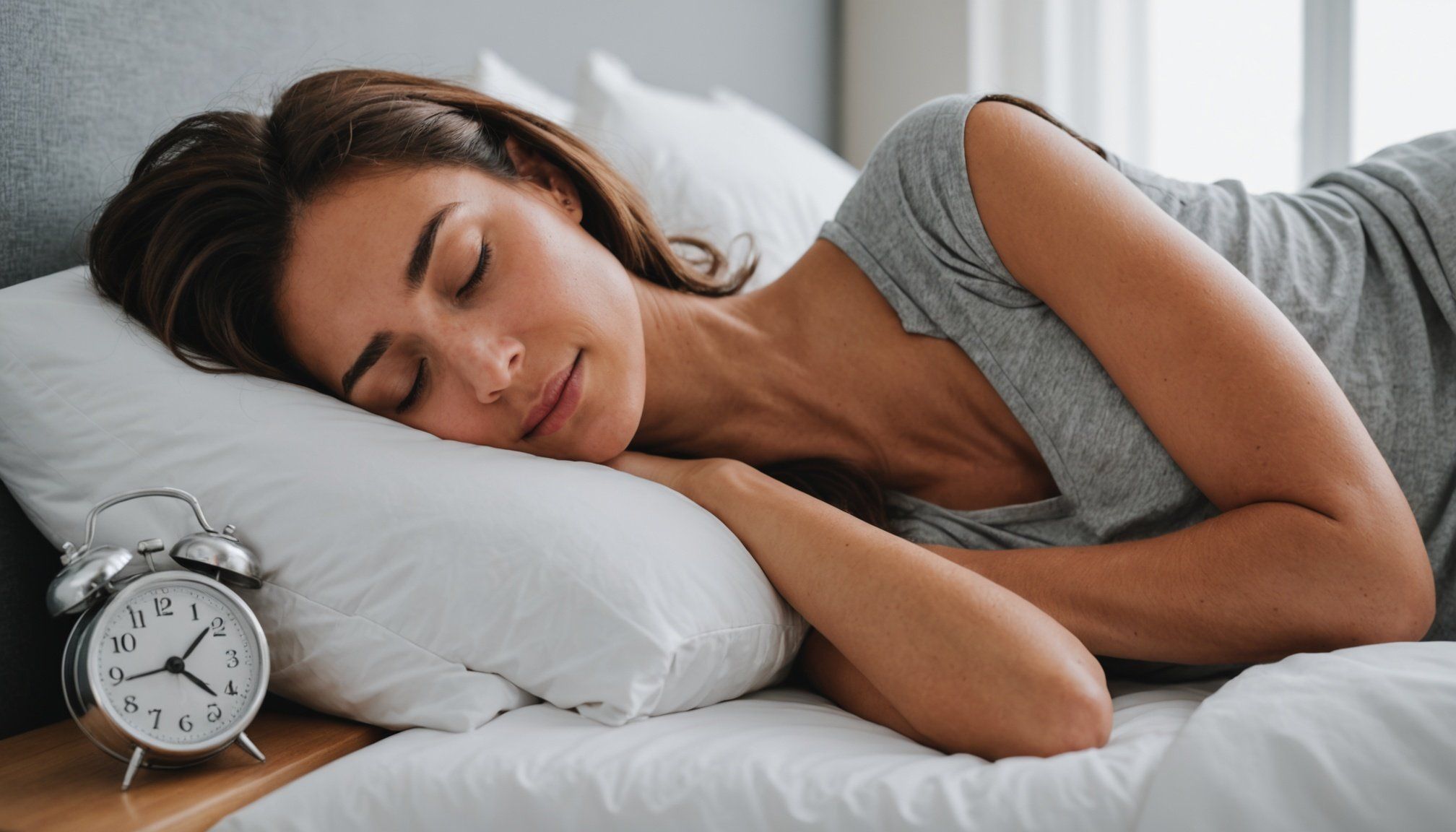Understanding Sleep Cycles
Sleep cycles play a critical role in maintaining our overall health and well-being. They consist of distinct sleep stages, each contributing uniquely to restful sleep. The cycles alternate between rapid eye movement (REM sleep) and non-REM sleep phases.
In non-REM sleep, there are three stages, each of which progressively takes you into deeper sleep. Stage 1 marks the transition from wakefulness, while Stage 2 is marked by a gradual slowdown in brain and body activity. Stage 3, or deep sleep, is arguably the most restorative, crucial for tissue repair and growth. Following this is REM sleep, an active phase where dreaming occurs and brain activity resembles that of being awake. It’s essential for cognitive functions like memory consolidation and problem-solving.
Also read : Essential joint health supplements for seniors in the uk: the ultimate guide to optimal mobility
The rotation between these phases ensures a balanced rest, which is why disrupted sleep cycles can lead to physical and mental disturbances. Sleep disorders or environmental disruptions can interrupt these cycles, reducing sleep quality and affecting daily performance. To help combat these effects, understanding the implications of each sleep stage can guide you to take measures that foster a more consistent and fulfilling sleep experience.
Importance of Sleep Hygiene
Sleep hygiene refers to healthy practices that promote restful sleep by addressing your sleep environment and nightly routines. It’s especially important to tailor these practices to UK homes, where unique lifestyle factors and environmental challenges can impact how well you rest.
In parallel : Discover the benefits of group fitness classes: a comprehensive guide for uk residents
To optimize your sleep environment, consider adjusting room temperature and lighting. A slightly cool room, along with blackout curtains, can improve sleep quality. In urban UK settings, minimizing noise with sound machines or heavy curtains aids in achieving a serene sleep space.
Establishing effective nightly routines is another pillar of sleep hygiene. Regular sleep schedules, where you go to bed and wake up at the same times every day, help regulate your body’s internal clock. Incorporating relaxation techniques, like mindfully unwinding an hour before bed, is key. Activities such as reading or gentle stretching can transition you into a sleep-ready state.
Adapting these practices not only improves sleep quality but also enhances overall well-being. When sleep hygiene becomes a habitual part of life, the result is not just improved rest but a heightened sense of balance and productivity throughout your day.
Addressing Common Sleep Disruptors in the UK
Navigating the sleep obstacles inherent to UK lifestyles often requires a strategic approach. Understanding the local context can illuminate why many residents experience issues with sleep. Late-night activities and vibrant social lives significantly affect how the body’s natural sleep rhythms, known as circadian rhythms, operate. Coupled with the technology use prevalent due to streaming services or smartphones, these distractions can thwart efforts to achieve a restful night.
One effective technique is managing screen time. Reducing device use, particularly an hour or two before bedtime, can markedly improve sleep quality by reducing exposure to blue light, which can interfere with melatonin production. This hormone is crucial for sleep.
Furthermore, adapting to seasonal changes can be challenging due to the UK’s variable daylight hours. To mitigate this, consistent sleep and wake times are vital, regardless of daylight fluctuations. Using blackout blinds can simulate night-time conditions conducive to sleep during the summer months, while wake-up lights can ease the transition to waking on darker winter mornings.
Adopting these habits is crucial not only for improving sleep quality but also for safeguarding overall health amidst the UK lifestyle factors. By understanding and addressing these local distractions, a path to more restful sleep becomes achievable.
Practical Tips for Better Sleep
Everyone desires a good night’s sleep, but achieving it can require some strategic planning. Implementing evidence-based relaxation techniques can significantly enhance sleep. Methods like progressive muscle relaxation or guided imagery are renowned for calming the mind and setting the stage for restful slumber. Such techniques focus on systematically relaxing the body’s muscle groups, which can ease tension and anxiety before bed.
Incorporating physical activity into your daily routine is another powerful tool for improving sleep quality. Regular exercise, even if it is light, can aid in falling asleep faster and enjoying deeper sleep. However, ensuring that vigorous activities are not too close to bedtime is essential, as they might have the opposite effect.
Furthermore, adopting pleasant bedtime rituals plays a crucial role in transitioning smoothly from wakefulness to sleep. Warm baths, soothing music, or engaging in a peaceful hobby can signal to your body that it is time to wind down. Creating a consistent pre-sleep pattern not only enhances sleep but also fosters a sense of tranquillity and well-being.
By embracing these relaxation techniques, engaging in physical activity, and establishing thoughtful bedtime rituals, you can significantly elevate your sleep experience and overall quality of life.
Utilizing Local Resources and Tools
In the UK, sleep resources are abundant and varied, offering numerous ways to tackle sleep issues. UK clinics stand at the forefront, providing specialised treatments for insomnia and other sleep disorders. Many such clinics are equipped with state-of-the-art facilities to conduct sleep studies, ensuring precise diagnoses and tailored therapy plans. They can guide you on the path to better sleep health.
Another resource gaining momentum is sleep apps, commonly used by individuals seeking to improve their sleep independently. Apps like Calm and Sleep Cycle provide features such as sleep tracking, meditation routines, and soothing soundscapes. These apps assist in understanding personal sleep patterns and facilitate the improvement of nightly routines. Their user-friendly interfaces make it simpler for both tech enthusiasts and novices to engage in sleep monitoring and management.
Community support is also crucial. Engaging with local sleep-oriented groups can provide a supportive network of people sharing similar experiences. Many regions have initiatives or forums where individuals can discuss sleep challenges, share insights, and offer encouragement. These community resources can foster motivation and accountability while working towards healthier sleep habits.
With these tools, improving sleep quality becomes not just a personal endeavour but a shared journey supported by both professional and community networks.
Expert Opinions and Personal Experiences
When exploring effective sleep strategies, it’s invaluable to gather insights from sleep specialists. Many experts emphasize the significance of maintaining consistent sleep schedules and prioritizing relaxation techniques like mindfulness meditation. These methods are often credited with enhancing sleep quality by fostering a tranquil pre-sleep state. Specialists also recommend reducing blue light exposure before bedtime, as it can disrupt your circadian rhythm.
Listening to personal anecdotes from UK residents who have tackled sleep challenges can be enlightening. Jane, from London, managed her insomnia by adopting a structured nightly routine and creating a sleep-friendly environment with weighted blankets and ambient sounds. Her story highlights the importance of customising sleep strategies to suit individual needs. Fred from Manchester found relief in digital tools like sleep apps, which helped in regulating his sleep patterns effectively.
The collective experiences within local communities provide numerous lessons. Engaging with others facing similar sleep issues fosters a supportive environment. Participation in discussion forums allows for sharing effective solutions and gaining encouragement. The integration of expert advice and personal experiences forms a comprehensive approach to overcoming sleep hurdles, paving the way for restorative rest.











